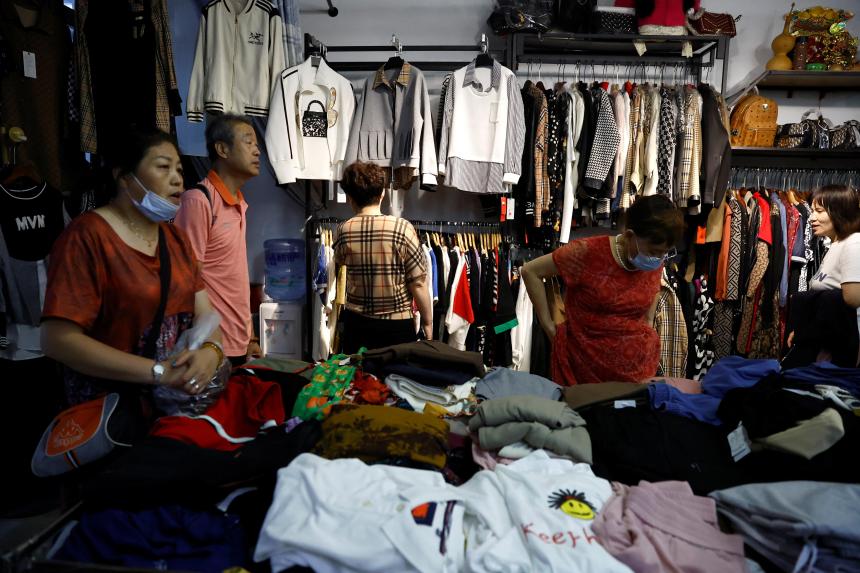BEIJING – China’s latest economic results have raised hopes that its fragile recovery is on firmer footing as growth between July and September came in at 4.9 per cent from the year earlier, led by a rebound across various indicators such as consumer spending, factory output and employment.
The latest figure beats expectations of economists polled by media outlets Reuters and Bloomberg, which had predicted third-quarter growth in the world’s second-largest economy to be at either 4.4 per cent or 4.5 per cent.
With the recent expansion, preliminary estimates announced on Wednesday showed that China’s economy has grown by 5.2 per cent in the first nine months of 2023 – above the around 5 per cent target set by the authorities.
The latest results lift China’s chances of hitting its goal by year end, analysts said, as policymakers’ efforts to boost the economy take hold, despite the continuing decline in the country’s property sector. In 2022, China missed its expansion target of around 5.5 per cent, growing 3 per cent mainly due to its zero-Covid policy and a harsh clampdown on its property and tech sectors.
China will need to achieve a 4.4 per cent growth year on year in the final three months of 2023 to hit its around 5 per cent target. It had grown 4.5 per cent in the first quarter and 6.3 per cent in the second quarter, compared with the same period in 2022.
Professor of Economics at China Europe International Business School in Shanghai Albert Hu said that the latest data, which showed a pickup in consumption, retail sales and factory output and a decline in unemployment in September, is encouraging. However, it is “too early to say that China’s economy is out of the woods”, he told The Straits Times.
“But the growth across the broad range of indicators are pointing to a firmer footing for China’s recovery,” he added.
Senior China economist Dong Jinyue at BBVA Bank in Hong Kong said that the latest figures have shown that the Chinese economy “is still resilient amid the authorities’ policy support to achieve a soft landing”.
This was despite the “backdrop of a very challenging domestic and international environment (such as) the housing market crash, dipping external demand and ever-escalating China-US tensions”, Dr Dong added.
To prop up the economy, the government had in September cut the amount of cash that banks needed to hold as reserves, injecting more than 500 billion yuan (S$95.4 billion) into the economy. It is the second reduction since the start of the year.
That month, policymakers had also lowered rates for existing mortgages and introduced tax cuts for families with children and elderly people to boost consumption.
Industrial output in September grew 4.5 per cent from a year ago, while growth in retail sales, a gauge for consumption, rose 5.5 per cent in the same period. Both indicators had surpassed economists’ expectations.
Unemployment fell to 5 per cent in September, down 0.2 percentage points from August, the latest data showed.
Dr Dong said: “The recent monetary and fiscal support of the Chinese authorities (have) helped to rebuild the sentiments of household and enterprises and paved the way for a more sustainable recovery going forward.”
China has been trying to boost domestic demand, which has remained tepid, amid a gloomier economic outlook due to its fragile recovery so far in 2023.
The property sector has remained in the doldrums amid the largely positive economic data, with property investment between January and September slumping 9.1 per cent from a year earlier, deepening from the 8.8 per cent slide recorded in the first eight months of 2023.
New home sales also fell 10 per cent and new project launches dropped 15 per cent in September from a year ago.
The figures, however, were an improvement from the 12 per cent drop in new home sales and 24 per cent drop in new projects recorded in August, in an early sign that the real estate market is slowly stabilising.
Prof Hu of China Europe International Business School said that the decline in the property sector, which used to be one of China’s most powerful growth engines, is likely to continue as the government is “intent on deflating the real estate bubble”.
On how the Israel-Hamas conflict could affect the global economy and China’s economy, analysts said it is too early to estimate.
But the United States seems set to avoid a recession, which will mean good news for China’s recovery. The US remains a big market for China’s exports, barring further deterioration in the US-China relationship.
To keep China’s recovery on track, however, policymakers will need to turn to new remedies instead of monetary stimulus – a method out of the country’s old playbook, said Dr Bruce Pang, chief economist and head of research for Greater China at real estate consultancy Jones Lang LaSalle, in Hong Kong.
Changes to fiscal and industrial policies such as the ad hoc issuance of additional debt from the central government would be needed – “just not ‘big bang’-style policy spurs”, he added.
“China’s recovery story could be a relay race, spurred by infrastructure investment at first, and hopefully fuelled by enterprises’ capital expenditure and household spending as follow-up,” Dr Pang said.


